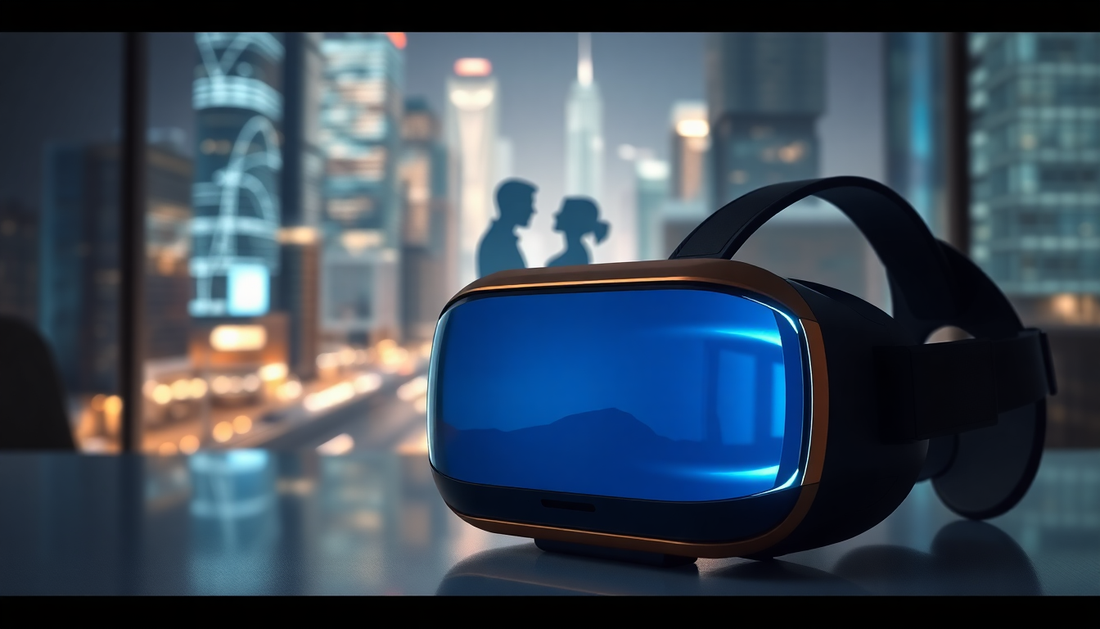
The VR Relationship Coaching Gig Earning $3,600 a Month
Golden Star GuideImagine earning thousands of dollars per month as a virtual reality (VR) relationship coach. It may sound like a futuristic dream, but for one anonymous individual, it's a very real and lucrative side hustle.
In this blog post, we'll dive into the fascinating world of VR relationship coaching and uncover the story of "Jordan," an expert in this emerging field who's making a killing from the comfort of their own home.
How the Hustle Works
VR relationship coaching is a unique and innovative approach to personal development. By leveraging the immersive power of virtual reality, coaches can create simulated environments where clients can practice conversations, roleplay dating scenarios, and build their confidence in a safe and controlled setting.
The process typically involves the client donning a VR headset and entering a virtual world, often a realistic-looking social setting like a cafe or a park. The coach, also equipped with VR gear, then guides the client through various exercises and interactions, providing real-time feedback and support.
This approach offers several advantages over traditional in-person coaching. Clients can explore their interpersonal challenges without the anxiety and pressure of real-world interactions. They can experiment with different communication styles, practice flirting, and even rehearse first dates – all within the safety of the virtual realm.
The $3,600-a-Month Story
Jordan, our anonymous VR relationship coach, stumbled upon this lucrative opportunity quite by accident. As an avid gamer and early adopter of virtual reality technology, Jordan had been exploring the various applications of VR beyond just entertainment.
"I was fascinated by the potential of VR to create immersive experiences that could genuinely help people," Jordan explains. "One day, I was browsing online forums and came across a thread about using VR for therapy and personal development. That's when the lightbulb went off."
Intrigued, Jordan began researching the field of VR coaching, particularly in the realm of relationships and social skills. They quickly realized that there was a growing demand for this unique service, as many individuals struggled with the challenges of modern dating and interpersonal communication.
Leveraging their background in psychology and their passion for technology, Jordan set out to create a VR relationship coaching business. They invested in a high-quality VR headset, a professional-grade microphone, and a subscription to a popular VR social platform like VRChat or AltspaceVR.
"The initial setup cost was a bit of an investment, but I knew it would pay off in the long run," Jordan says. "Once I had the necessary equipment and started marketing my services, the clients started rolling in."
Jordan's unique approach to VR relationship coaching quickly gained traction, and within a few months, they were earning a consistent $3,600 per month from their side hustle. The key to their success? A combination of effective marketing, a personalized coaching approach, and the ability to create a safe and engaging virtual environment for their clients.
Tools and Setup
To become a successful VR relationship coach, you'll need a few essential pieces of equipment and software. At a minimum, you'll require a high-quality VR headset, such as the Oculus Rift, HTC Vive, or Valve Index. These headsets provide the immersive experience that is crucial for your coaching sessions.
In addition to the VR headset, you'll also need a good quality microphone to ensure clear communication with your clients. A USB condenser microphone or a headset with a built-in mic can work well.
As for the software, you'll want to choose a VR social platform that offers the features and functionality you need for your coaching sessions. Popular options include VRChat, AltspaceVR, and Rec Room. These platforms allow you to create custom virtual environments, interact with clients in real-time, and even record sessions for review and feedback.
Some coaches may also choose to obtain additional certifications or training in areas like relationship counseling, social skills development, or even virtual reality therapy. While not strictly necessary, these credentials can help you stand out in the market and demonstrate your expertise.
Finding Clients
Once you have your VR setup and coaching approach dialed in, the next step is to start finding clients. There are several avenues you can explore:
-
VR Social Platforms: Engage with the VR community by participating in forums, groups, and events. Offer free trial sessions or workshops to showcase your expertise and attract potential clients.
-
Online Coaching Marketplaces: List your VR relationship coaching services on platforms like Coaching.com, Noomii, or Upwork. These sites can help you reach a wider audience and connect with clients who are specifically seeking virtual coaching services.
-
Dating Forums and Communities: Identify online forums, subreddits, or Facebook groups where people discuss dating, relationships, and personal development. Offer your VR coaching services as a unique solution to common challenges.
-
Referrals and Networking: Leverage your existing network of friends, family, and professional contacts. Ask them to spread the word about your VR coaching services, and encourage satisfied clients to refer their friends and acquaintances.
When it comes to marketing your VR relationship coaching business, it's important to maintain a level of anonymity and privacy. You can use a pseudonym or a business name to protect your personal identity, while still showcasing your expertise and the value of your services.
Why This Works
The appeal of VR relationship coaching lies in its ability to create a safe, controlled, and immersive environment for clients to explore their interpersonal challenges. By removing the real-world pressures and anxieties, clients can focus on developing their social skills and building confidence without the fear of judgment or rejection.
"One of the biggest benefits of VR coaching is the emotional safety it provides," Jordan explains. "Clients can practice conversations, roleplay dating scenarios, and even work on their body language, all without the stress of a real-world interaction. It's a game-changer for people who struggle with social anxiety or shyness."
Moreover, the virtual setting allows for a level of customization and personalization that is difficult to achieve in traditional coaching settings. Coaches can create tailored virtual environments that cater to the specific needs and preferences of their clients, further enhancing the effectiveness of the coaching sessions.
Challenges and Considerations
While VR relationship coaching offers numerous benefits, it's not without its challenges. Coaches must be mindful of maintaining appropriate emotional boundaries with their clients, as the immersive nature of the virtual environment can sometimes blur the lines.
Additionally, the reliance on technology can present its own set of obstacles. Technical glitches, software updates, and hardware malfunctions can disrupt the flow of a coaching session, requiring coaches to be adaptable and problem-solving.
Privacy and confidentiality are also crucial concerns in this field. Coaches must ensure that they protect the identities and personal information of their clients, both within the virtual environment and in their marketing and communication channels.
Getting Started
If you're intrigued by the idea of becoming a VR relationship coach, here are some steps to get you started:
-
Invest in the Necessary Gear: Acquire a high-quality VR headset, a professional-grade microphone, and subscribe to a suitable VR social platform.
-
Develop Your Coaching Expertise: Consider obtaining relevant certifications or training in areas like relationship counseling, social skills development, or virtual reality therapy.
-
Create a Compelling Coaching Approach: Develop a unique and effective VR coaching methodology that addresses the specific needs of your target clients.
-
Build Your Online Presence: Establish a professional website, create social media profiles, and start networking within the VR and coaching communities.
-
Market Your Services: Leverage various channels, such as VR social platforms, online coaching marketplaces, and dating forums, to attract and engage with potential clients.
-
Continuously Improve and Adapt: Stay up-to-date with the latest trends and technologies in the VR and coaching industries, and be willing to adapt your approach as needed.
As the world of virtual reality continues to evolve, the opportunities for innovative and lucrative side hustles like VR relationship coaching are only going to grow. With the right mindset, skills, and a bit of entrepreneurial spirit, you too could be earning thousands of dollars per month as a VR relationship coach.
So, what are you waiting for? Strap on your VR headset and start building your path to a thriving virtual coaching business.



